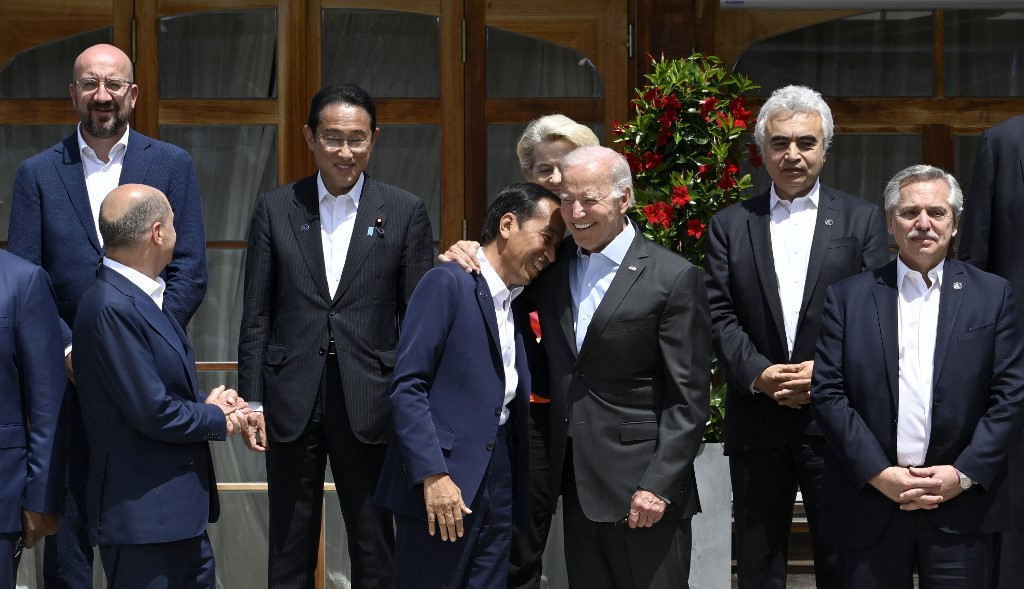Popular Reads
Top Results
Can't find what you're looking for?
View all search resultsPopular Reads
Top Results
Can't find what you're looking for?
View all search resultsG7 calls on RI to cap Russian oil prices
Observers warn of domestic market disruption, diplomatic costs of proposed scheme.
Change text size
Gift Premium Articles
to Anyone
T
he Group of Seven has called on Indonesia to join its supplemental alliance, the G7+, and impose a price cap on Russian oil to bring the commodity down to pre-war prices, a United States official told The Jakarta Post on Tuesday.
Some Indonesian executives were also scheduled to hold meetings this week with US Treasury Department assistant Elizabeth Rosenberg to discuss the topic, the official said.
In late June, the United Kingdom announced that the G7 was “exploring further measures to prevent Russia from profiting from its war of aggression”, including the prohibition of all services that enabled the global transportation of oil products “unless the oil is purchased at or below a price to be agreed in consultation with international partners”.
[Https://www.gov.uk/government/news/g7-foreign-ministers-statement-on-energy-security]
The US official, speaking on condition of anonymity, said that while the G7 nations had already placed sanctions on Russian oil products, they were now seeking support in these measures from countries outside the group, such as Indonesia, Malaysia, Australia and Japan.
The US has described the plan as “a novel idea” intended to “take the money away from Russia and give it to developing countries”.
“There are two kinds of countries that are in the G7+: countries that are exporting oil from Russia [and] those that do not export but provide financial and insurance services on oil transportation,” the US official said.
State-owned oil company Pertamina and the country as a whole stood to benefit from the scheme, the official added, because Jakarta had been paying “a lot of money in [oil] subsidies”.
“[Indonesia would get to purchase] Russian oil at a lower market price, so this would be beneficial for them,” said the official.
The G7 policy is set to come into effect on Dec. 5.
In July, the government more than tripled its subsidy budget to Rp 520 trillion.
[/business/2022/07/03/2022-deficit-to-hit-below-4-despite-subsidy-hike-govt.html]
How Moscow will react to the scheme remains a concern, the official said, with the worst-case scenario being the complete halt of Russian oil sales.
But Russia might still be willing to continue production and sales provided the market price exceeded the production cost of US$10 per barrel, the official added.
At the Group of 20 Finance Ministers’ Meeting in mid-July, US Secretary of the Treasury Janet L. Yellen met with Finance Minister Sri Mulyani and Coordinating Maritime Affairs and Investment Minister Luhut Panjaitan to suggest that Indonesia join the price cap scheme.
At the time, Sri Mulyani told the Post that Yellen was still determining the technical details of the plan and that Indonesia would “listen to what is being presented as well as its implications since this will heavily affect oil-producing countries and their purchasers”.
It is unclear whether Sri Mulyani will be among those meeting with Rosenberg this week.
Potential downsides
Some observers say Indonesia should stay out of the scheme.
Fithra Faisal, executive director at Next Policy, a think tank, said the proposal could disrupt market mechanisms and exacerbate global oil scarcity.
“Whenever there is a price cap, it tends to result in scarcity. This means there is no way everything would get better. It would be worse,” Faisal told the Post on Wednesday.
He pointed to Indonesia's recent decision to put a price cap on cooking oil of Rp 14,000 per liter – a policy that eventually led to the disappearance of the product from official markets.
Faisal said Moscow would likely decrease its production, as it could not sell oil at its actual market price to countries participating in the price cap. At worst, he said, it could lead to a black market for oil.
Padjadjaran University international relations expert Teuku Rezasyah claimed the price cap idea directly opposed the American value of free competition.
The scheme could also jeopardize Indonesia’s relations with other nations, Teuku said.
“Whatever decision Indonesia ends up making as a result of the G7’s pressure, it will heavily affect the long-term relationship between Jakarta and Moscow, as well as with the G7 nations,” he said.
“This coercive price cap scheme could potentially fracture Indonesia’s domestic development, which relies on an uninterrupted supply of energy – regardless of where it comes from.”
Lingering questions
Teuku did not think other countries courted by the G7 would necessarily agree to the cap.
“They would not want to be pinned down as a G7 groupie and risk receiving energy sanctions from Russia.”
This is not first time Indonesia has been caught between competing interests with regard to Russia’s invasion of Ukraine.
In April, Indonesia’s faced the prospect of the failure of its G20 presidency after it decided to go against calls to bar Russia from the proceedings.
[/world/2022/04/30/us-frowns-on-indonesias-invite-to-putin-for-g20-summit.html]
Jakarta insisted that it must remain “impartial”.
When asked on Wednesday whether the government was exploring the G7’s proposal, Sri Mulyani said, “I do not know. I am not involved.”
At the time of writing, the Foreign Ministry had not responded to the Post’s requests for comment.










